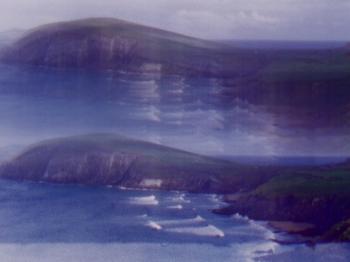David Edward GATTEN is an American experimental filmmaker and moving image artist. Since 1996 Gatten's films have explored the intersection of the printed word and moving image, cataloging the variety of ways in which texts functions in cinema as both language and image, often blurring the boundary between these categories. His 16mm films often employee cameraless techniques, combined with close-up cinematography and optical printing processes. In addition to the ongoing 16mm films, Gatten is now making hybrid 16mm/digital works and has completed an entirely digital feature-length project called The Extravagant Shadows.
Among other projects, he is currently working on a series of films entitled Secret History of the Dividing Line, a True Account in Nine Parts, a project which Artforum magazine called “one of the most erudite and ambitious undertakings in recent cinema.” He was awarded a Guggenheim Fellowship in 2005 [6] to continue work on this series of films exploring the library of William Byrd II of Westover (1674-1744) and the lives of William Byrd and his daughter Evelyn Byrd (1707-1737).
In November 2011 Texts of Light: A Mid-Career Retrospective of Fourteen Films by David Gatten, curated by Chris Stults, opened at the Wexner Center for the Arts. The three program retrospective screened in 2012 at the National Gallery of Art in Washington, DC; Harvard Film Archive; San Francisco Museum of Modern Art and other venues in San Francesco; and at REDCAT, The LA Film Forum and The Velaslavasay Panorama in Los Angeles.
Two of Gatten’s newest works premiered in the Fall of 2012. The Extravagant Shadows is a 175-minute work of high-definition digital cinema. It premiered at Lincoln Center in the New York Film Festival. The Extravagant Shadows was recently named the one of the "Top 10 Undistributed Movies of 2012" by a Film Comment international film critics poll magazine.
A hybrid 16mm/HD piece, By Pain and Rhyme and Arabesques of Foraging premiered at the British Film Institute in the London Film Festival and nominated for the Tiger award at the International Film Festival Rotterdam.
Gatten is currently Lecturing Fellow & Artist in Residence Program in the Arts of the Moving Image & MFA in Experimental & Documentary Arts at Duke University.
ERIN ESPELIE is a filmmaker, writer, editor, and university lecturer, based in the Colorado Rockies and New York City. As a filmmaker, Espelie works with a range of media, from Super 8 film to high-definition digital video, to make poetic, nonfiction cinema about issues in environmental history, current scientific research, and questions of epistemology. Her films have shown at the New York Film Festival, the British Film Institute, the Nasher Museum of Art, the Rotterdam International Film Festival, the Edinburgh International Film Festival, the Singapore International Film Festival, and more.
Most of her professional career in print has been on the staff of Natural History magazine, where she serves as executive editor and a columnist. Since 2002 her monthly column, "The Natural Explanation," has highlighted high-caliber wildlife photographers and human influences on the environment. She also freelances for a variety of publications. A scientist by training, Espelie holds a degree in molecular biology and genetics from Cornell University. She has worked in bacteriology and virology laboratories at the University of Georgia, the University of Wisconsin-Madison, and Cornell.
In 2010 Espelie was awarded a Ted Scripps Visiting Faculty Fellowship in the School of Environmental Journalism at the University of Colorado Boulder and spent the year researching the human microbiome and completing a film about the chytrid fungus. In the spring of 2012 she will join the faculty of the Center for Documentary Studies at Duke University, teaching two courses: "Environmental Issues and the Documentary Arts," in conjunction with the Duke's Nicholas School of the Environment, and "Contemporary Documentary Cinema," in collaboration with the Program in the Arts of the Moving Image.
Program
Program is based around water, place, science, the changing (and unchanging) environment and systems of representation. Total running time: 72 minutes, plus introductory remarks.
Journal and Remarks 2009, 15 minutes, color, silent, 16mm by David Gatten
Silent Springs 2011, 13 minutes, color, sound, HDCAM by Erin Espelie
The Sea Seeks Its Own Level 2013, 6 minutes, color, sound, HDCAM, by Erin Espelie
What the Water Said, nos. 4-6 2007, 17 minutes, color, sound, 16mm by David Gatten
Shrimp Boat Log 2006 / re-cut and printed 2010, 6 minutes, color, silent, 16mm by David Gatten
True-Life Adventure I 2012, 5 min
True-Life Adventure II 2013, 5 min
True-Life Adventure III 2013, 6 min
all color, sound, HDCAM by Erin Espelie
Realised in collaboration with FAMU, program series curated by Henry Hills, visit is supported by Trust for Mutual Understanding.








